Key Takeaways
Concrete pools are built from reinforced gunite or shotcrete over a rebar frame, creating a structure that can last 50+ years with proper care.
They offer unmatched customization: shape, depth, finishes, and features like waterfalls or infinity edges are all possible.
Compared to fiberglass or vinyl pools, concrete pools handle heavy use, resist wear, and add premium value to your property.
Construction involves excavation, rebar installation, concrete spraying, curing, and finishing touches like plaster or tile.
Expect higher upfront costs ($50K-$100K on average) plus permits, landscaping, and long‑term maintenance like resurfacing every 10-15 years.
Regular upkeep includes cleaning, balancing water chemistry, and occasional repairs, with annual chemical costs around $500-$1,000.
Sustainability options as variable‑speed pumps, solar heating, LED lights, UV/ozone filtration, and eco‑friendly treatments can lower costs and environmental impact.
Concrete pools suit any climate and aesthetic, making them a lasting investment that blends luxury, functionality, and design freedom.
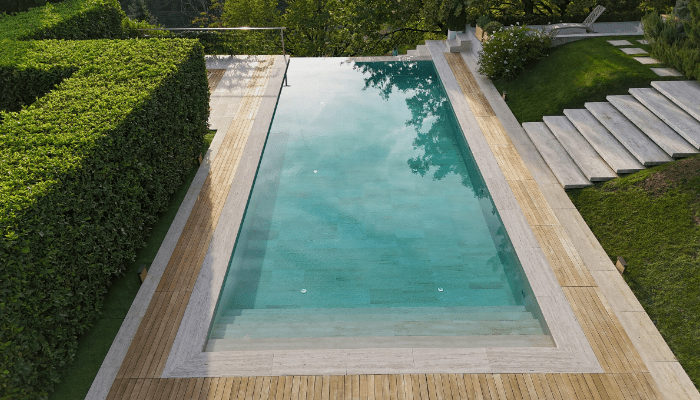
Everyone has a vision of their own private backyard paradise – a sanctuary where you can simply escape the relentless rhythm of everyday life and float starfish-style in a serene pool. But there’s one element that stands between you and the backyard of your dreams: which type of pool you choose! Perhaps you’ve heard whispers of fiberglass pools, vinyl-lined options, and of course, the timeless classic – concrete pools.
Now, while it’s true that fiberglass pools are known for their ease of maintenance and vinyl-lined options may have a simpler installation process, there’s something special about concrete pools. They’re the epitome of enduring craftsmanship, offering a triple-whammy of long-lasting durability, limitless design potential, and that extra touch of luxury that will have your neighbors peering over the fence in awe!
Still with us? Excellent! In this blog, we’ll immerse ourselves in everything you need to know about concrete pools, from the intricate details of their construction to their upkeep, from the financial considerations to safety features, and why they’re the ultimate choice for your next backyard transformation. So, pour yourself a refreshing drink, find a comfortable spot, and let’s explore why a concrete pool might just be the crowning jewel of your home!
Want a More Healthy & Natural Solution?
What Are Concrete Pools?
Alright, let’s get down to the nitty-gritty of what a concrete pool really is. Concrete pools are the go-to choice for those looking for something serious – something that can take whatever your backyard throws at it and still look good doing it.
Definition: A concrete pool is, well, a pool made out of… concrete. Surprised? Probably not! But beyond the obvious, this in particular is gunite or shotcrete concrete, which is fancy talk for “super strong, can-handle-anything concrete.” It’s applied in layers over a rebar skeleton, which essentially makes your pool a solid, reinforced concrete structure that can withstand the test of time and a few cannonballs from your kids (or you!).
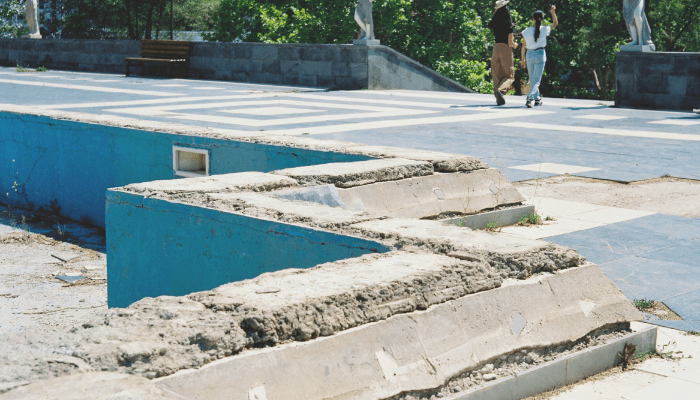
Concrete Pools’ Construction Process
So, how do they go from an empty hole in the ground to that gorgeous oasis from your dreams? Let’s go over the basic construction process, because concrete pools are like the fine wine of pools… they’re not to be rushed!
Excavation: First things first, someone’s gotta dig the hole.
Framework and Rebar: After the hole is dug, the pool’s skeleton gets built. That means metal rebar is installed in a crisscross pattern, like an intricate web of steel ready to hold the concrete together like a superhero’s cape. It’s all about making sure that your pool can withstand the pressure of years of water, kids, parties, and other such general abuse!
Gunite or Shotcrete Application: Here comes the fun part. This is where the magic happens. Gunite or shotcrete (both are essentially sprayed concrete) is shot out of a high-pressure hose and applied to the rebar skeleton, creating a concrete fortress – one smooth, satisfyingly sculpted layer at a time.
Curing: After the concrete is applied, the curing process begins. Now the concrete needs time to chillax, set, dry, and harden to reach its full strength – this usually takes a few weeks. But don’t worry, your pool contractor will keep an eye on it to make sure everything is solid – no need for you to babysit!
Finishing Touches: Finally, once the structure is solid, it’s time to get creative with the surface! This is where you can choose from different finishes like plaster, pebble, or even glass tiles (if you want your pool to sparkle under the sun, go for a glittering glass tile finish – it’ll make your pool look like it’s straight out of heaven!).

Benefits of Concrete Pools (AKA Why You Should Totally Get One)
Alright, let’s dive into the juicy stuff – why are concrete pools such a solid choice? Let’s break it down in a way that doesn’t put you to sleep!
Durability: Concrete Pools Are Built Like Tanks
Concrete pools are built to last… and then some. Unlike fiberglass or vinyl pools, which can start showing their age after a decade or so (hello, fading and cracking!), concrete pools laugh in the face of such mere mortals! If you take care of it, a concrete pool can last 50 years or more. And when it finally needs a little love – maybe some resurfacing? No big deal. Basically, concrete pools can handle life like nothing else and give you some serious decades-long bang for your buck!
Customization: You’re the Boss of Your Pool
One of the most alluring qualities of concrete pools lies in their unequalled customizability. You can go for an infinity-edge oasis, or a human-sized margarita glass, a secluded lagoon with a cascading waterfall – consider it all brought to life! Concrete pools are the ultimate blank canvas, capable of being sculpted into any shape, size, or depth you desire – so when it comes to these bad boys, if you can dream it, the experts can craft it!
Increase Home Value: Because Who Doesn’t Want a Pool That Pays for Itself?
One thing’s for sure – not all pools are created equal. Fiberglass pools are great, but they can’t compete with the sheer sophistication of a concrete pool! Concrete pools are considered premium, and when you have a premium pool, you’ve got a little something special in your backyard. In fact, concrete pools can actually boost the value of your home. Yep, that’s right – installing a concrete pool isn’t solely about summer fun. It’s a real asset and an investment in your home’s worth!
Perfect for Any Climate: The Pool That Just Won’t Quit
In literally any season or temperature, concrete pools have your back. In hotter climates, they retain cool water temperatures, and in chillier areas, you can always add heating options to make sure your pool is warm and ready when you want to take that post-barbecue dip!
Aesthetic Appeal: Gorgeous Doesn’t Even Begin to Cover It
Looks matter… and concrete pools look good. Whether you’re going for sleek, modern vibes or something a bit more rustic, concrete pools can fit basically any aesthetic – and unlike fiberglass or vinyl pools, which might look a bit… well, manufactured, concrete pools have a natural elegance that never goes out of style.
You can customize the finish too – do you like smooth plaster, shiny tiles, or maybe a pebble finish for that natural feel? The world (and your pool design) is your oyster!
Concrete Pools vs. Other Pool Types: The Ultimate Showdown
Let’s dive into the pool world and see how concrete pools measure up against the competition. We’re comparing concrete pools to fiberglass, vinyl, and natural pools, so let’s get to it!
Concrete Pools vs. Fiberglass Pools: The Hulk vs. The Supermodel
Fiberglass pools are sleek, factory-made, and come in pre-set shapes. They’re easier to install and cost less initially, but they lack the personality of concrete pools. Want a custom pool with unique shapes, a swim-up bar, or a built-in cave? Concrete’s got your back! Plus, concrete pools last much longer than fiberglass, which can show wear over time with surface scratches or fading.
Concrete Pools vs. Vinyl Pools: The Undercover Agent vs. The Diva
Vinyl pools are affordable and low-maintenance at first, but over time, their liners can tear or look worn out. Concrete pools don’t need a liner and last much longer – just a little resurfacing every 10-15 years keeps them looking fresh. They’re tough, can handle a lot, and are perfect for all your cannonball-loving friends.
Final Verdict: Concrete Pools, Baby!
If you want a pool that’s as tough as nails, totally customizable, and ready for years of pool parties, concrete is the way to go. It’s the rockstar of the pool world, capable of handling whatever wild design you throw at it and still looking fabulous after 20 years. Sure, it takes a little more maintenance than fiberglass or vinyl, but the results are totally worth it. Plus, when it comes to pool design, you’re only limited by your imagination (and maybe your budget).
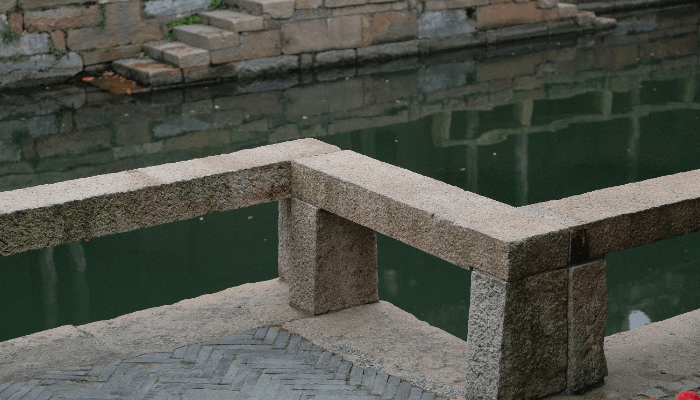
Cost of Concrete Pools: Let’s Talk Money (But Not Too Seriously)
Alright, let’s discuss costs. We know, we know, talking about money isn’t exactly the fun part, but it’s gotta be done! When you’re eyeing a concrete pool, the dollar signs can start adding up quickly. But here’s the thing: it’s an investment, my friend. So, let’s break it down, shall we?
The Upfront Costs: The Big Splash
You’re probably wondering, “How much is this thing going to actually cost me?” And the answer is: it depends. Yep, the price tag can vary based on a ton of factors, like:
- Size of the Pool: Go big or go home, right? The larger the pool, the higher the cost. So if you want a massive lagoon where you can pretend to be the next James Bond (or ahem… just want a lot of room for laps), you’re going to pay for that extra space. Learn more about why pool size matters in our comprehensive guide!
- Design Features: Thinking about adding a waterfall that makes your backyard look like a tropical paradise? Or maybe a custom infinity edge that screams, “I’m classy”? These features add to the cost, but hey, it’s worth it if you want to live that luxe poolside life.
- Location: Where you live can affect the price too. If you’re in a city with crazy high labor costs (looking at you, major metropolitan areas), you can usually expect the price to reflect that. But if you’re in a small town where pool builders can still afford to buy coffee, you might find yourself with a slightly more affordable option!
On average, you’re looking at anywhere between $50,000 to $100,000 for a custom concrete pool. We know – yikes, that’s a lot of dough! But here’s the twist: a concrete pool is built to last, so it’s an investment that should last you decades. It’s like paying upfront for a lifetime of lazy poolside days. Can’t really put a price on that, can you?
Hidden Costs: The Little Things That Add Up
Now, don’t get too comfy, because we’ve got some extra costs to think about. You know, the sneaky stuff that pops up when you’re about to sign the dotted line.
- Permits: Yes, your friendly local government might want a cut. Depending on where you are, you might need permits to dig that beautiful concrete masterpiece into your backyard. Local regulations can vary, so it’s important to check with a professional before you get your shovel out!
- Excavation: You’ll need to dig a hole before you can fill it with water, right? Excavation costs can add a few thousand bucks to your total bill. But hey, at least it’s not you doing the digging!
- Landscaping: Once the pool is built, you’re probably going to want to dress up your pool area with some landscaping. Think patios, walkways, or a nice little firepit to gather around while you sip on something fancy. Landscaping costs can vary depending on what you want, but don’t forget to factor it in – because you don’t want to be that person with a pool surrounded by a bunch of weeds. Make sure to do plenty of reading and choose the best people around for this crucial task!
Long-Term Costs: Keeping It Fresh and Clean (Without Selling Your Soul)
Concrete pools are solid investments, but just like your car or your pet goldfish, they need maintenance to stay in tip-top shape! Here’s what you can expect in terms of long-term costs:
- Regular Maintenance: Keeping your pool clean and healthy means regular upkeep. Pool cleaning services can run anywhere from $100 to $400 a month, depending on how often you need someone to come by. If you’re feeling adventurous, you can do it yourself, just be ready for some back-breaking skimming, scrubbing, and vacuuming. (But hey, you’ll get those sweet “pool owner” bragging rights.)
- Repairs: The older the pool, the more likely you’ll need to patch up any cracks or redo the surface every 10-15 years. Resurfacing a concrete pool can cost anywhere from $5,000 to $10,000. But think of it this way, you’re just giving your pool a makeover. Everyone loves a good glow-up.
- Chemicals: To keep your pool sparkling clean and ready for cannonballs, you’ll need to stay on top of your pool chemistry. Chlorine, pH balancers, algaecides, these little guys add up over time, typically running $500–$1,000 a year, depending on your pool size.
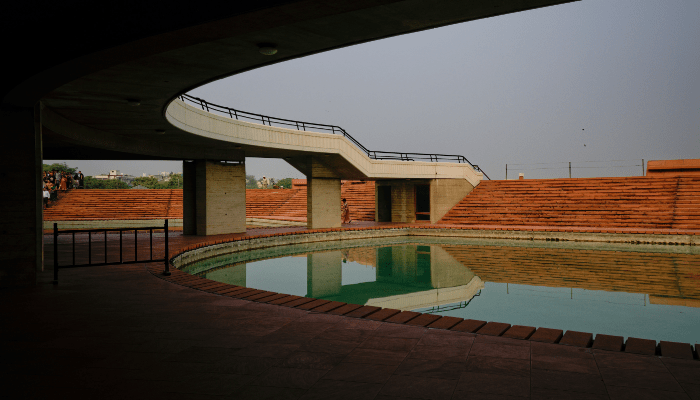
Environmental Considerations and Sustainability
Alright, let’s talk about going green, because who doesn’t love a pool that’s both fun *and* eco-friendly? If you’re the type of person who enjoys lounging by a pool while feeling good about your carbon footprint, you’re in for a treat.
Energy-Efficient Systems
First up, let’s chat about keeping those energy bills in check. Nobody wants a pool that sucks up more power than a kid with a iPad addiction. Enter energy-efficient systems! You can get pumps that run at variable speeds, meaning they don’t just blast at full speed all day long. This gives you more control over your energy consumption, kind of like choosing how much coffee you need in the morning. Too much? You’ll be bouncing off the walls. Too little? You’ll still be half asleep. Finding that sweet spot? That’s the goal for your pump speed too.
And hey, while we’re talking energy, solar heating is your friend. Imagine using the sun, you know, that big, fiery ball of energy in the sky, to warm up your pool instead of relying on your electricity. You can go full eco-warrior mode with solar panels that feed energy straight into your pool’s heating system. Mother Nature will thank you, and so will your electric bill!
LED Lighting
It’s no secret that LED lights are the cool kids of the lighting world. They’re energy-efficient, durable, and – let’s be honest – just look great. Swap out those traditional pool lights with LEDs, and you’ll reduce your pool’s energy consumption by a huge margin – plus, you get to have a pool that lights up like something out of a futuristic movie! Think about it: glowing water at night, like you’re in *Tron* or a high-budget sci-fi film.
Eco-Friendly Pool Treatments
Now, let’s move on to the good stuff – keeping the pool sparkling clean without pumping chemicals into the environment like it’s a Willy Wonka factory of chlorine. You’ve got options here: go for natural or mineral-based pool treatments instead of the usual chemical cocktail. These are much gentler on the environment, and they keep the water clearer than a crisp mountain stream (well, sort of). If you want to avoid the whole “heavy chemical smell” that makes you feel like you’ve walked into a science lab, this is the way to go!
Ozone and UV Filtration
Speaking of keeping things clean without overloading on chemicals, here’s a fun fact: UV light and ozone treatments work wonders for keeping your pool clear and fresh without turning it into a toxic swamp. UV light works like a bouncer at a club, kicking out algae at the cellular level. Meanwhile, ozone treatment breaks down organic waste like a clean-up crew at a wild party. Less algae, less muck, more swim time for you. And all of this helps reduce the need for harsh chemicals, which, honestly, makes your pool a *lot* more chill (literally and figuratively).
At Oásis Biosistema, we’re all about the balance between nature and technology, just like a Zen garden meets high-tech filtration. Imagine blending plants, fish, and a high-performance filtration system that uses gravity to clean the water. We’ve got Japanese mats, brushes, and media that grab onto all the gunk, and then our submerged pump takes the clean water and returns it, like a constant flow of water goodness. Add in UV and ozone treatments, and bam, crystal clear water with *minimal effort*. It’s like we’ve created the Zen master of pools.
So yeah, with a little effort and a few clever systems, your pool can be as eco-friendly as it is fun. You’ll get that clear water, have less of a strain on the environment, and still enjoy all the benefits of your backyard oasis. It’s like having your cake and eating it too. But in this case, it’s a crystal-clear pool, not cake. (Though, if you want to bring cake to the pool, we won’t stop you.)
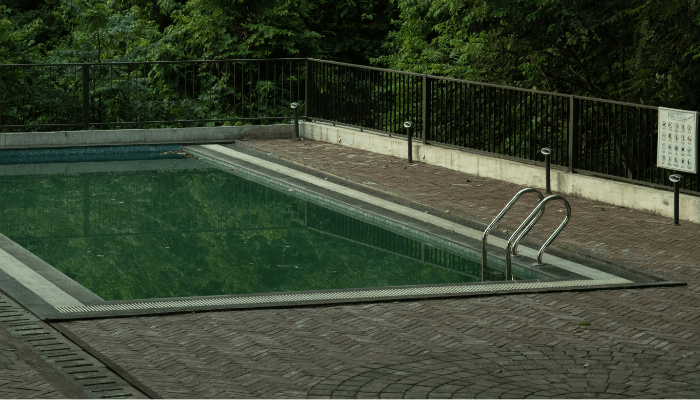
Conclusion
To wrap things up, concrete pools are a solid (pun intended) choice for homeowners looking for durability, flexibility, and endless customization options – no limitations, just possibilities. Concrete pools last decades, resist wear and tear, and can withstand almost anything your backyard throws at them. From the surface to the depth, every inch is built to last!
So if you’re looking for a long-term investment, concrete pools are the way to go. Sure, they may come with a bigger price tag upfront, but they’re built for longevity and customization, making them a smart choice for homeowners who want something that truly stands the test of time. Plus, as we mentioned earlier, they can increase your home’s value. Who wouldn’t want that?
In the same way that Oásis Biosistema takes custom design to the next level with their unique filtration systems and biological balance, concrete pools offer the ultimate flexibility to meet the needs and preferences of any homeowner. Whether you’re aiming for a pool that feels like part of your natural landscape or one with cutting-edge features, concrete makes it happen. Customization is key, and with the right design, your pool can be both a functional investment and a beautiful centerpiece!
Still have questions about concrete pools or wondering if they’re the right fit for your backyard? Don’t hesitate to reach out for a consultation! We can help you explore your options, answer any burning questions, and guide you through the process of getting your dream pool sorted.
Build a pool that’s made to last and made for you.
At Oásis Biosistema, we design custom concrete pools that blend strength, sustainability, and style. No templates. Just your vision, built right.

FAQ
What is a Concrete Pool?
A concrete pool is built on-site using reinforced concrete, then finished with plaster or tile. It allows full customization of shape, size, and depth. Also called gunite or shotcrete pools.
How Long Do Concrete Pools Last?
With proper maintenance, concrete pools can last 50+ years. They’re more durable than vinyl or fiberglass and can be resurfaced to extend life.
Are Concrete Pools Cheaper?
They cost more upfront but last longer and need fewer replacements, making them cost-effective over time. Custom features can increase the price.
What Are the Pros and Cons of a Concrete Pool?
Pros:
- Fully customizable design
- Extremely durable
- Adds value to your home
Cons:
- Higher initial cost
- Requires regular maintenance
- Longer to build than other types



